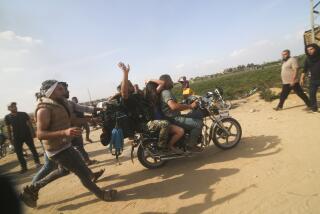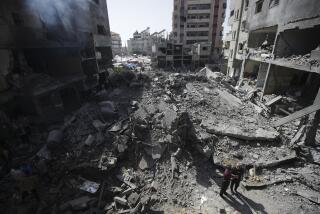Islamic militants accused of war crimes in northern Iraq offensive
Fighters from an Al Qaeda-spawned militia now controlling much of northeastern Iraq allegedly committed summary executions, rapes and kidnappings this week while seizing the city of Mosul, the United Nations’ human rights chief said Friday.
Navi Pillay, the U.N. high commissioner for human rights in Geneva, expressed “extreme alarm” at the humanitarian crisis evolving from the conquest Tuesday of one of Iraq’s largest cities by the Islamic State of Iraq and Syria, or ISIS.
ISIS fighters freed and armed prisoners from Mosul jails who “have been actively seeking out -- and in some cases killing -- soldiers, police and others, including civilians -- whom they perceive as being associated with the government,” Pillay said.
The summary executions reported to the Geneva office included 17 civilians slain on a single street of Mosul, said Rupert Colville, spokesman for the U.N. rights office.
Iraqis fleeing Mosul after the militants’ onslaught said four women had committed suicide after being raped by the insurgents, Colville said.
ISIS fighters also reportedly kidnapped 16 citizens of the former Soviet republic of Georgia who were working for a Mosul telecommunications company, Colville told reporters at a briefing at the U.N.’s European headquarters.
“The full extent of civilian casualties is not yet known, but reports suggest the number of people killed in recent days may run into the hundreds, and the number of wounded is said to be approaching 1,000,” Pillay said in a statement.
A U.N. investigation in March of ISIS fighters’ conduct in Syria’s civil war found that the radical militia that broke with its Al Qaeda founders last year committed grave human rights abuses and crimes against humanity, and their actions in Iraq will be under “particular scrutiny” due to that documented history, Pillay said.
“I am extremely concerned about the acute vulnerability of civilians caught in the crossfire, or targeted in direct attacks by armed groups, or trapped in areas under the control of [militants] and their allies,” Pillay said.
More than 500,000 Mosul residents have fled since the surprise attack on Tuesday, most of them to the city of Irbil and its surroundings in the Kurdistan autonomous region of northern Iraq.
The U.N. World Food Program and Office of the High Commissioner for Refugees have mobilized humanitarian aid for the displaced, many of whom fled with little more than what they were wearing, said Adrian Edwards, spokesman for the refugee agency.
Edwards said the U.N. agencies are helping the Iraqi government put together a camp for the displaced in Khazir, about 25 miles north of Mosul.
“Over the past two days, UNHCR has helped the government pitch tents there, and is providing plastic sheets, hygiene kits and other relief items to the displaced,” and other U.N. agencies are installing latrines and water tanks, Edwards said.
The local community has been providing food for the refugees taking shelter in schools, churches and empty buildings up until now, he said, while the World Food Program organizes long-term food delivery for what most Middle East analysts expect to be an occupation by the militants that could last for months or longer.
Follow @cjwilliamslat for the latest international news 24/7
More to Read
Sign up for Essential California
The most important California stories and recommendations in your inbox every morning.
You may occasionally receive promotional content from the Los Angeles Times.










